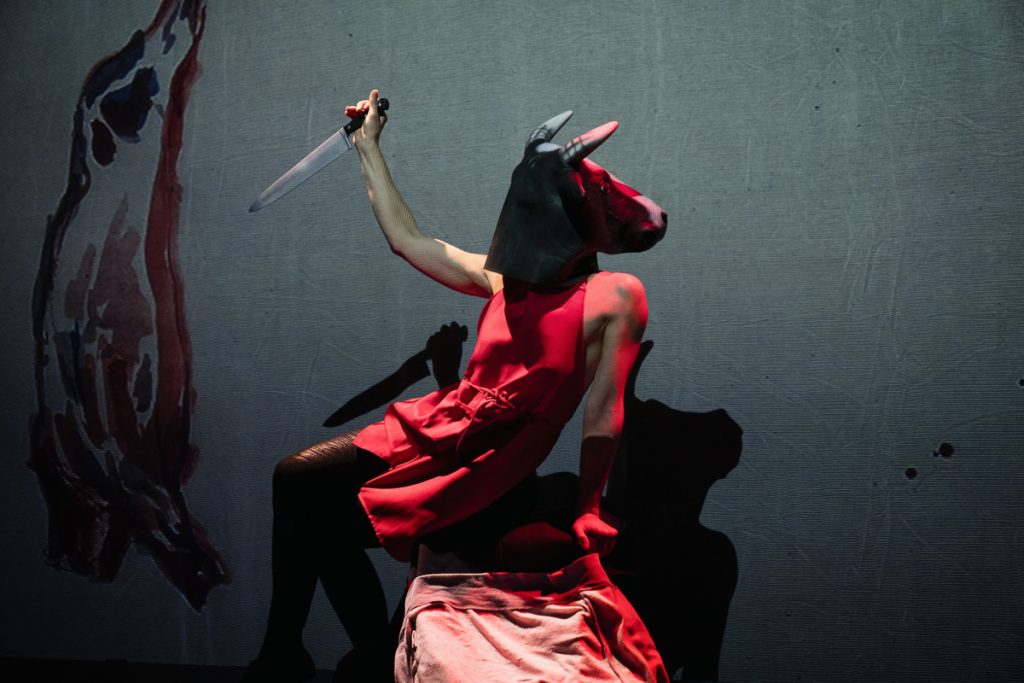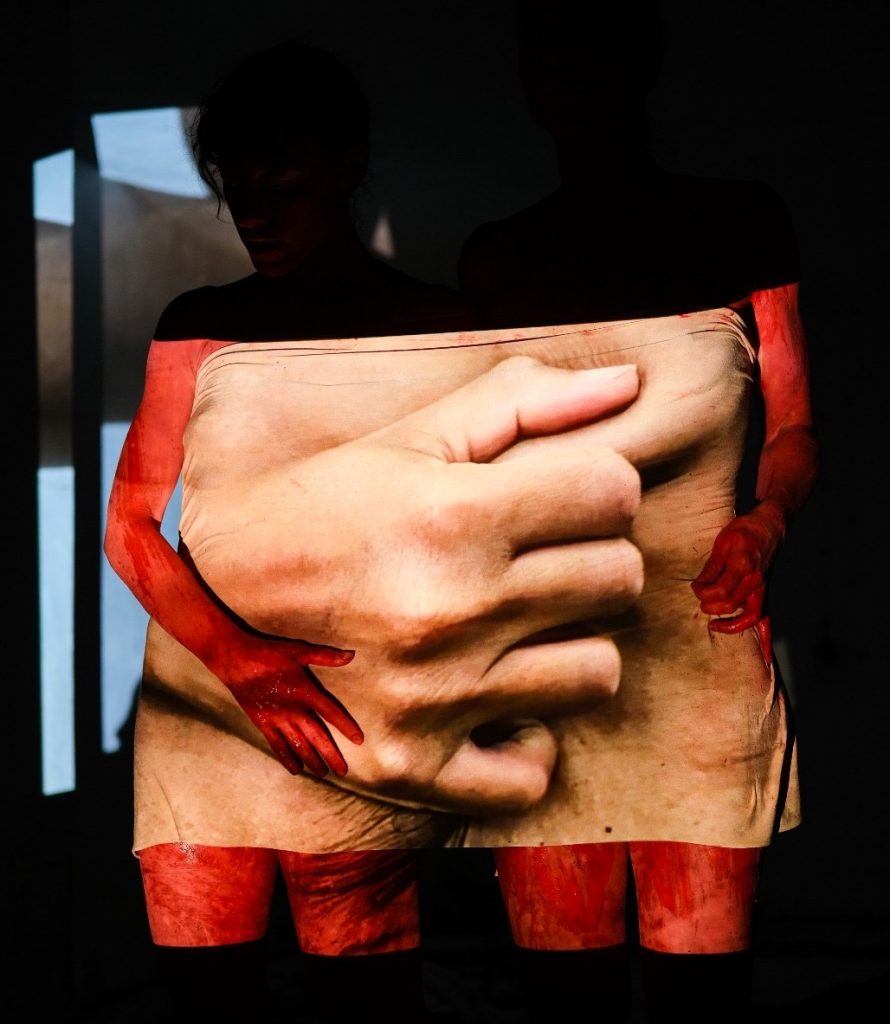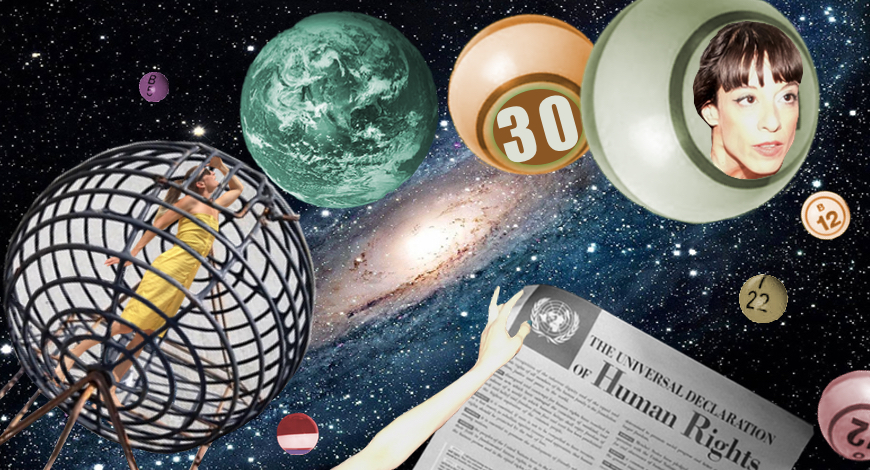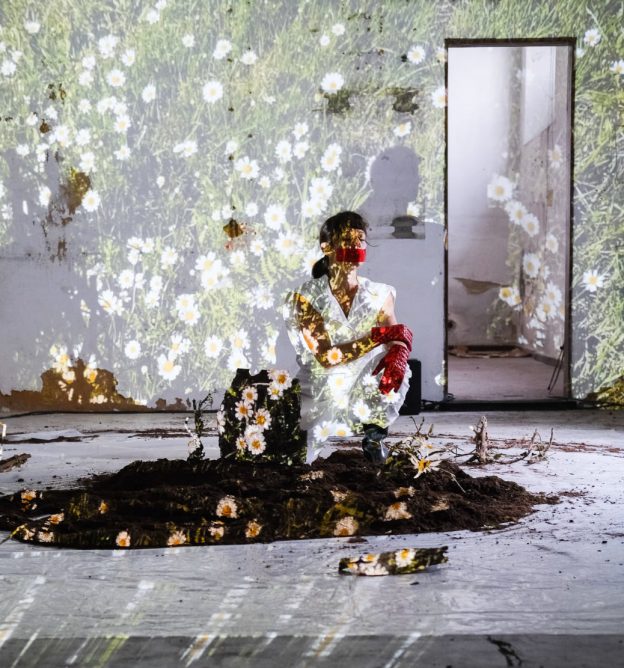Well, can it? Then how? Where do we start? Yael Karavan asks the questions and tries to find some answers
As far back as I can remember, from a very young age, I’ve been involved with the performing arts; exploring ways to break the mundane reality into an unexpected, absurd, surreal and poetic visual realm. I travelled the world to learn from and work with masters in Russia, Brazil, Japan and Europe, looking to create a bridge between East and West and between dance and theatre. I searched for the fine line between the intimate and the collective, the tragic and the comic. I deconstructed form, and mixed different physical performance languages aiming to create bold and cutting edge work.
But now I feel that this is, somehow, no longer enough.
I grew up very close to my father who is an environmental sculptor. I have seen him create public artworks around the world with the clear aim of raising awareness on issues of peace, human rights, and our environment. He used to say that one needs to constantly fight in order to bring about peace. I have seen him fight for the world and for his art since I was a little child. He is now celebrating his 90th birthday and very much still fighting for humanity. I suspect that his political involvement through his work, and the energy he has constantly poured into it, has been a great influence on the responsibility I feel as an artist.
I consider myself to be a generally positive person, but the current state of the world calls me to action. Maybe there comes a certain age when an artist changes her focus from her own belly button to the belly button of the world?
So what do you think, can art really save our planet? And if so, then how?

In the last couple of years I’ve been mainly involved in the creation of various projects on climate related themes. I realised that I was feeling angry and helpless and I therefore searched for ways to transform these energies creatively – my aim being to find ways, through my work, to raise awareness and to question the sustainability of our actions.
Holy Cow was my first project directly raising the question: Can art save our planet? It’s a solo, in collaboration with illustrator Izhar Cohen, questioning how we can inspire behaviour change in relation to the devastating effects industrialised meat has on our climate, especially in relation to cows and the unbelievable ways they are mistreated. I explored ways of transmitting these facts by creating little scenes, like little worlds, partly live and partly illustrated, where non-verbal live movement work is paired with filmed sections of animated landscapes being created and transformed. In some of the scenes I am incorporating (a great word, deriving from the Latin in-corpo, meaning literally ‘inside the body of…’ ) a cow, bringing a more human element to it, while the illustrations are bringing both the horror and the poetry as they create the background to the pieces. One of the scenes is a duet with singer/songwriter Tim Harbridge who wrote a love song to a cow. So much do we love our cows that we are unable to give up eating them, bringing them suffering, and bringing on our own demise!
I explored playfulness, trying to make the experience more ‘digestible’ with a quiz in which the uncomfortable facts are displayed: trying to raise awareness through interactive gaming as I felt nobody wanted to look the horror straight in the eye – it’s simply too much. After the sharing, some people said they were seriously considering changing their habits especially in relation to milk consumption. (If you look at the way milk is mass-produced I’m sure you won’t believe it yourself). But as time passes, people forget and go back to their habits. Trying to have a wider effect, I looked into extending the project into schools – young people, being the next generation, are potentially affected the most. But during the creation process I realised that these kids were born into a world of plenty, and parents are often misled to believe that without eating three protein-based meals a day their kids will be malnourished and weak. ‘I like salmon so much’ said a 12-year-old girl at the school where I shared the development process, I do too,, but there must be a middle way, not an all-or-nothing way…. From one of the interviews I did as part of the R&D process, with eating psychology coach Sue Bradley, I learnt that the more we try to forbid ourselves from eating certain things, the more we crave them. No doubt that we, human beings, are a very complex species.
Can art undo what we have so carefully and steadily built? Our habits? Our comfort? In an accelerating capitalistic product-based world?

Another project I am currently developing is MA-MA, a duet with Portuguese performer/dancer Rita Vilhena, exploring the parallels between Mother Earth and a female/human body. The current coronavirus pandemic has emphasised the connection we have with the planet: how for decades we have been polluting the lungs of the earth, and now it is our turn to be suffocated from our own doings. Some say that ten years ago it was already known that a pandemic would happen if we did not change our behaviour towards our planet. Not much seems to have been done since, and we are now reaping the fruits of our wrong-doing. Is our time for action running-out? As part of the creation process, we spent three weeks in the breathtaking wild nature of north Portugal. We wanted to bring people into the experience we had: I named it ‘the best shopping centre in the world’, as we collected parts of trees, stones, sounds and images. We filmed the beautiful nature we encountered and made it into the visual background of the show. We brought more than 50 kilos of earth onto the stage, searching to awake a sense of connection and a sensorial experience. We made three different versions of this piece until we eventually realised that, like nature itself, this performance has to be in constant transformation, and in accordance with the place/space where it is performed.
When sharing the work I realised we were ‘preaching to the converted’ as we were sharing it with people mainly from the art scene, who are already aware and active on these issues. We therefore came up with an extension of this project – a large format dance film created in the same abundant natural landscapes, aiming to bring the countryside back into the cities; creating a feeling that nature is invading the urban spaces by projecting the film in various public spaces and on big buildings, and thus reaching beyond regular theatre-goers; pairing it with an interactive community project where audience members bring small plants and thus create small green spaces in the city where the film is projected. This project was also thought up as a way to make Covid-safe work.
The need to reach a wider spectrum of people brought me to yet another collaboration, with Spanish philosopher Vincent Ordonez. We have built a website – ArtForThePlanet.space using artworks donated by artists working in many different media – visual art, performance, music, poetry and more – with the aim of sharing it with schools, universities, community centres, and libraries.

Last but not least, most recently – and specifically in response to the current Covid-19 pandemic and the affect it has had on our sector, imposing restrictions on live performance – I created and performed Human Rights Bingo with internationally acclaimed artist Silvia Mercuriali – a live, online performance presented as part of Voila! Europe Festival. Our aim: to create an interactive game-show on the theme of the Universal Declaration of Human Rights, on Zoom – exploring this overused online platform in as many creative ways as possible in order to bring to life a unique participatory, fun experience; bringing people together and raising awareness whilst creating a sense of community and togetherness amongst audience members (something I feel we are in a deep need of in these isolating Covid times).
We wondered if people were aware of their rights, and how to defend them if they were violated. This feels like a potential danger as we leave the EU, and people in England, Wales and Scotland are no longer party to the European Convention on Human Rights, which is upheld by the European Court. We wanted to do something that is not preachy or moralistic but fun and revealing. I believe that if we want people to be more active we need to activate them as our audiences – and they seemed to be ready and willing for this! One of the show’s reviews said:
‘Bingo! is a wild re-imagining of the familiar game… The competitive element fades quickly as collective involvement becomes top priority. It’s a nudge to let ourselves off the hook, but remember our rights, and a bold illustration of our corrupt reality, where agency of freedom comes down to the same kind of luck as a game of numbers’ – The UP coming
100% of audience members who filled up our feedback forms said the show was a good opportunity to learn about our human rights in a fun and interactive way.
So what do you think? Can that really bring about change?
I guess you can see how desperate I am – throwing my arrows to all possible directions…
Another step on my path towards connection and understanding, linking life and art: I have practiced Butoh for more than 20 years: researching, studying, teaching, dancing. Butoh is a philosophy and a method, not a technique. It is a way of living and seeing the world around us. It helped me realise that life is made of contradictions, and that darkness is a necessary part of the light. It focused my contribution to this world by working towards balancing the forces of creation and destruction.
Butoh has reconnected me to nature and the animal world within and without, and brought me into an uncompromising search for the essence of life and death. I’m inclined to use a powerful metaphor given by its founder Tatsumi Hijikata. Butoh in direct translation means threading and/or stepping, and the metaphor is that every step we take is facilitated thanks to our ancestors, who support each one of our steps from beneath our feet. As I am looking into these supporting hands beneath my feet I can definitely feel the support of Hijikata and his deconstruction of the ‘domesticated’ body. The revolution of the flesh, against the American capitalisation of Japan, where the performance act is not a product for consumption but an experience between performers and their audience.
I can also feel the support of Bertolt Brecht and the Epic Theatre he was exploring, bringing political issues to his audiences by breaking the fourth wall, as well as the use of popular theatre mores, in order to reach wider audiences.
Before I take another step I can just about see Augusto Boal and his Theatre of the Oppressed. Exploring various forms of theatre in order to tackle social and political problems. Bringing his audiences into action through his Forum Theatre and his Invisible Theatre. Placing theatre in unexpected places to raise the most pressing issues, inspiring conversation and the possibility for change.
Everything connects…
A short while ago I watched the absolutely must-see documentary by David Attenborough, A Life on Our Planet (Netflix). A couple of the phrases he said which deeply struck a chord were: ‘We must rewild the world!’ and ‘Becoming once again a part of nature and not apart from nature.’
A few days later, I experienced a sort of revelation.
As I was teaching a Butoh workshop, I could see how my students were transforming. As they peeled away some of their ‘domesticated’ layers they became more ‘wild’ allowing themselves to rediscover their fundamental connection to the nature around them and within them. I saw them become more sensitive, more open to their environment.
My question is: how can I bring my audiences to this experience and state of being? And how can I reach the people who are unaware of, or unwilling to accept, what’s to come – without threats or preaching, but with openness and a sense of togetherness.
After all, we are all in it together – and this planet is our one and only home.
Yael Karavan is an award-winning performer, dancer and artistic director of the Karavan Ensemble. She participated in the Total Theatre Artists as Writers programme 2020.
http://yaelkaravan.com @karavanensemble
Featured image (top): Yael Karavan and Rita Vilhena: MA-MA. Photo by Josefa Searle


